Serving 309 students in grades 6-12, Bay Area Technology ranks in the bottom 50% of all schools in California for overall test scores (math proficiency is bottom 50%, and reading proficiency is bottom 50%).
The percentage of students achieving proficiency in math is 6-9% (which is lower than the California state average of 33%). The percentage of students achieving proficiency in reading/language arts is 20-24% (which is lower than the California state average of 47%).
The student:teacher ratio of 26:1 is higher than the California state level of 21:1.
Minority enrollment is 99% of the student body (majority Hispanic), which is higher than the California state average of 80% (majority Hispanic).
Quick Stats (2025)
- School Type: Charter School
- Grades: 6-12
- Enrollment: 309 students
- Student:Teacher Ratio: 26:1
- Minority Enrollment: 99%
- Graduation Rate: ≥80% (Btm 50% in CA)
- Overall Testing Rank: Bottom 50%
- Math Proficiency: 6-9% (Btm 50%)
- Reading Proficiency: 20-24% (Btm 50%)
- Science Proficiency: ≤5% (Btm 50%)
- Source: National Center for Education Statistics (NCES), CA Dept. of Education
School Overview
Bay Area Technology's student population of 309 students has stayed relatively flat over five school years.
The teacher population of 12 teachers has declined by 7% over five school years.
School Type
Grades Offered
Grades 6-12
Total Students
309 students
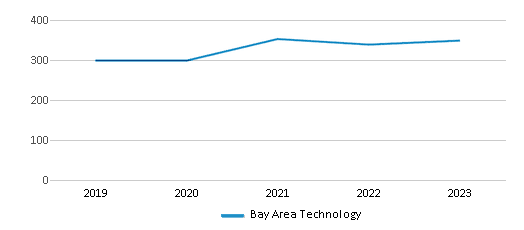
Gender %
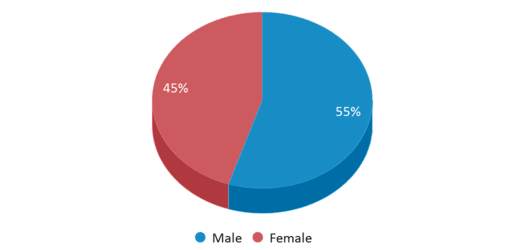
Total Classroom Teachers
12 teachers
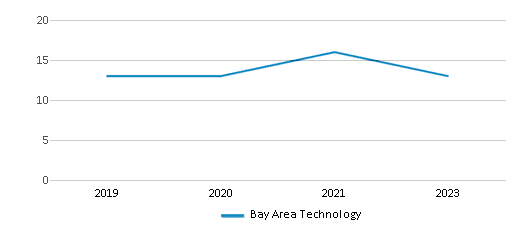
Students by Grade
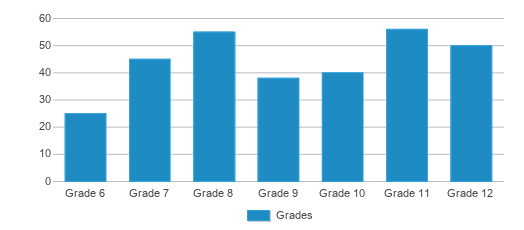
School Rankings
Bay Area Technology ranks within the bottom 50% of all 9,602 schools in California (based off of combined math and reading proficiency testing data).
The diversity score of Bay Area Technology is 0.43, which is less than the diversity score at state average of 0.63. The school's diversity has stayed relatively flat over five school years.
Overall Testing Rank
#8868 out of 9602 schools
(Bottom 50%)
(Bottom 50%)
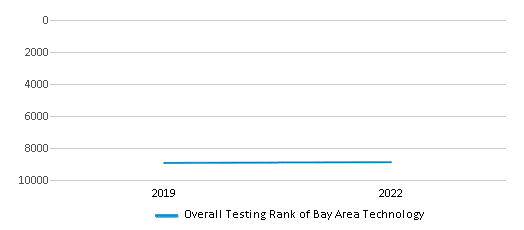
Math Test Scores (% Proficient)
6-9%
33%
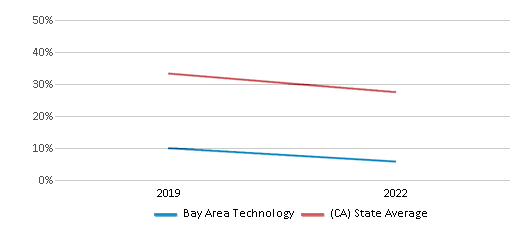
Reading/Language Arts Test Scores (% Proficient)
20-24%
47%
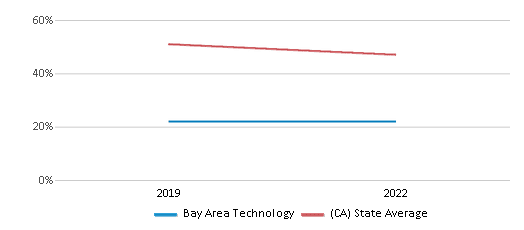
Science Test Scores (% Proficient)
≤5%
29%
Student : Teacher Ratio
26:1
21:1
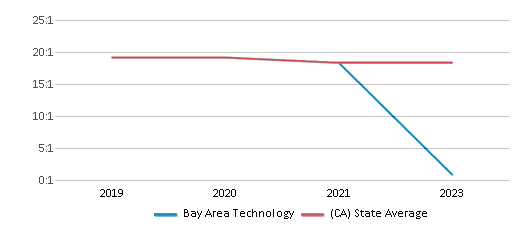
American Indian
n/a
1%
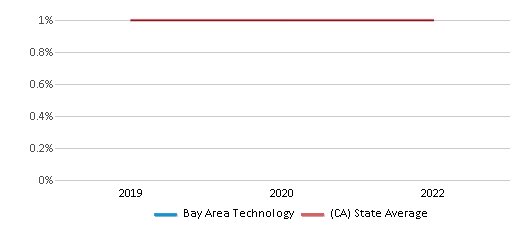
Asian
2%
12%
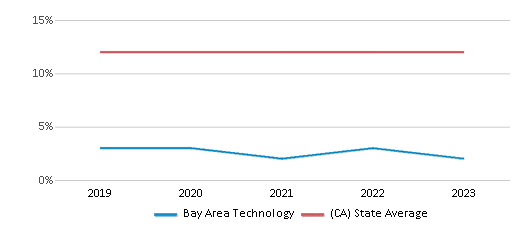
Hispanic
73%
56%
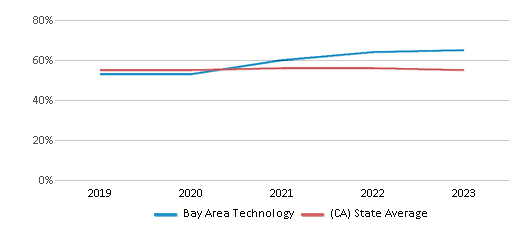
Black
19%
5%
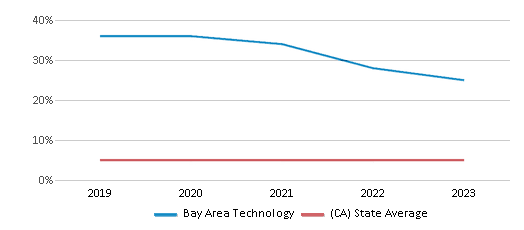
White
1%
20%
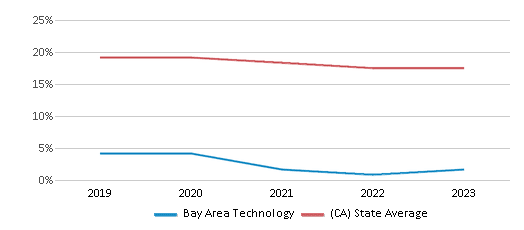
Hawaiian
n/a
n/a
Two or more races
5%
6%
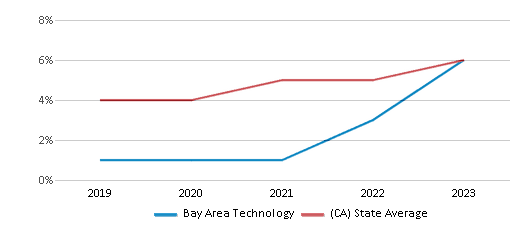
All Ethnic Groups
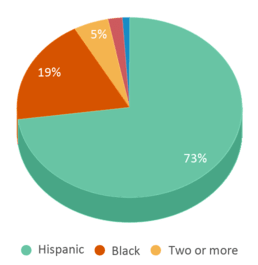
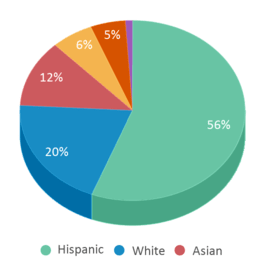
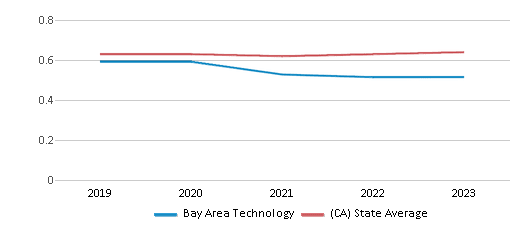
Graduation Rate
≥80%
87%
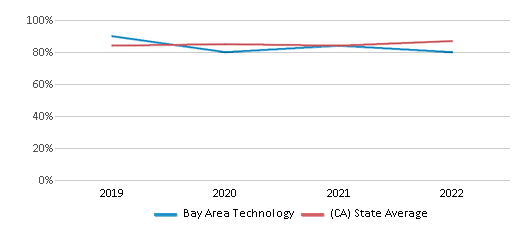
Eligible for Free Lunch
71%
54%
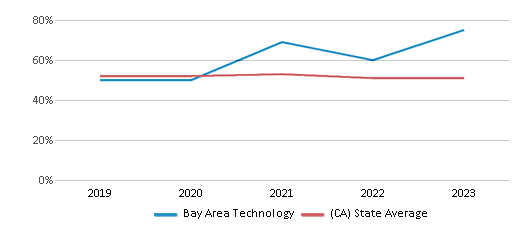
Eligible for Reduced Lunch
10%
8%
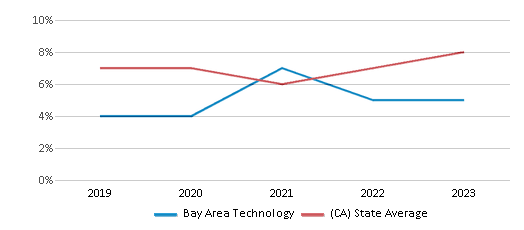
School Statewide Testing
School District Name
Extracurriculars
Total ExtracurricularsTotal Extra-curric.
21 extracurriculars
ExtracurricularsExtra-curric.
Advanced Math and Science Olympiad Program, AP History Tutoring, Arts & Crafts Club, Backgammon Club, Basketball Club, Creative Writing Club, Digital Arts Club, Diversity Club, Europe Trip Club, Folk Dance Club, Geography Bee, Homework Club, Honor Society, Lego Robotics Club, Mentoring Club, Science Fair and Olympiad Club, Science Turoting Club, Simcity Club, Soccer Club, Student Council, Taekwondo Club
Source: National Center for Education Statistics (NCES), CA Dept. of Education
Profile last updated: 02/09/2025
Frequently Asked Questions
What is Bay Area Technology's ranking?
Bay Area Technology is ranked #8868 out of 9,602 schools, which ranks it among the bottom 50% of public schools in California.
What percent of students have achieved state testing proficiency in math and reading?
6-9% of students have achieved math proficiency (compared to the 33% CA state average), while 20-24% of students have achieved reading proficiency (compared to the 47% CA state average).
What is the graduation rate of Bay Area Technology?
The graduation rate of Bay Area Technology is 80%, which is lower than the California state average of 87%.
How many students attend Bay Area Technology?
309 students attend Bay Area Technology.
What is the racial composition of the student body?
73% of Bay Area Technology students are Hispanic, 19% of students are Black, 5% of students are Two or more races, 2% of students are Asian, and 1% of students are White.
What is the student:teacher ratio of Bay Area Technology?
Bay Area Technology has a student ration of 26:1, which is higher than the California state average of 21:1.
What grades does Bay Area Technology offer ?
Bay Area Technology offers enrollment in grades 6-12
What school district is Bay Area Technology part of?
Bay Area Technology is part of Bay Area Technology School District.
In what neighborhood is Bay Area Technology located?
Bay Area Technology is located in the Oak Knoll Golf Links neighborhood of Oakland, CA. There are 3 other public schools located in Oak Knoll Golf Links.
School Reviews
5 2/25/2011
The best community school in Oakland, great teachers, dedicated staff, advanced programs for GATE students, free after school programs until 6 pm.
what else does a parent want?
5 6/21/2010
This school was a blessing for my child. The teachers actually cared and spent extra hours trying to teach my child. We had to move out of town last year and my son still misses his teachers.
5 3/22/2010
Our school is the best. We will have football next year !
Review Bay Area Technology. Reviews should be a few sentences in length. Please include any comments on:
- Quality of academic programs, teachers, and facilities
- Availability of music, art, sports and other extracurricular activities
Recent Articles

What Is A Charter School?
Explore the world of charter schools in this comprehensive guide. Learn about their history, how they operate, and the pros and cons of this educational innovation. Discover key facts about charter schools, including admission policies, demographics, and funding, as well as what to look for when considering a charter school for your child.

10 Reasons Why High School Sports Benefit Students
Discover the 10 compelling reasons why high school sports are beneficial for students. This comprehensive article explores how athletics enhance academic performance, foster personal growth, and develop crucial life skills. From improved fitness and time management to leadership development and community representation, learn why participating in high school sports can be a game-changer for students' overall success and well-being.

February 05, 2025
Understanding the U.S. Department of Education: Structure, Impact, and EvolutionWe explore how the Department of Education shapes American education, from its cabinet-level leadership to its impact on millions of students, written for general audiences seeking clarity on this vital institution.









